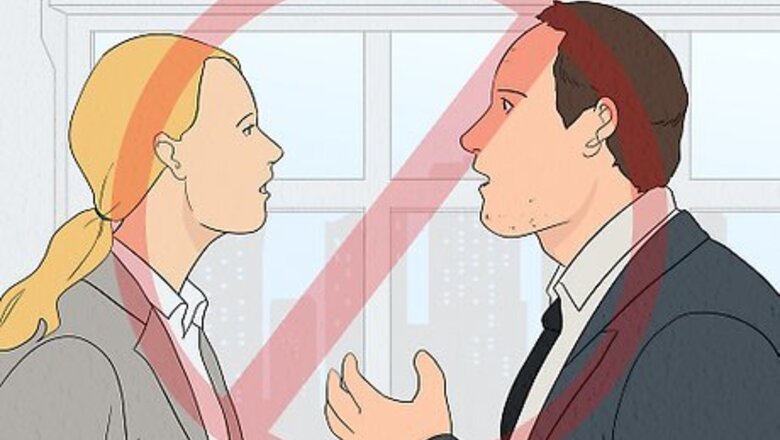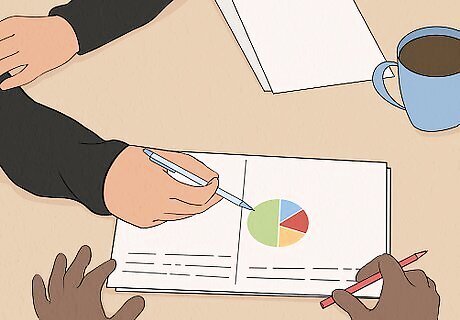
views
Being Courteous

Don't call the person out. One of the worst things you can do when dealing with people who are less intelligent than you is to let them know that you think they are stupid. This will only make them angry, which means they will not be listening to you. If you want to communicate effectively with people, never tell them you think they are stupid (or insult them in any other way). If you get frustrated with someone who just doesn't seem to understand something, try asking them what you can do to help them understand, instead of insulting them for their lack of abilities. For example, you could say, "I see you're struggling to understand this math problem. How can I help?"

Look for their strengths. Everyone is good at something, so try to hone in on other people's talents. A person may be less intelligent than you, but have better people skills or be a faster typist. Recognizing that all of these skills are important and valuable will help you appreciate others more. Encourage the person by pointing out their strengths and complimenting them, even if they are struggling with other things. For example, you could say, "I know you're having a hard time getting used to the computer system, but you did a great job interacting with the customers today."

Be empathetic. No matter what you think of other people, you should always treat them as you would want to be treated. Being kind and respectful, regardless of how you feel about someone, will make it much easier to get along. If you're having trouble being empathetic, take a moment to try to see the world through the other person's eyes. This may help you recognize their unique talents and appreciate how hard it is to deal with people who are more intelligent. Don't start arguments, even if you truly believe the other person is wrong. This will most likely be futile and will just frustrate you. If you feel the need to express your point of view, consider saying something like, "I think ________, but your idea is interesting too," instead of, "You're wrong. The right way to do this is ________."

Think carefully before reporting them at a workplace. Sometimes it's best not to say anything about another person's lack of intelligence, even if you are forced to work with them. Be sure to carefully consider whether reporting the situation will benefit you in any way. If you work with the person, be sure to think about how your boss might react to your comments before you report them. If you determine that any negative reaction is worth the risk, be sure to approach the situation by talking about specific facts, rather than your own opinions of the person. If you go to the school with the person and have to work with him on a project, treat the conversation with your teacher the same way you would if you were an employee talking to your boss — stick to the facts. You could say something like, "I noticed that X is having a lot of trouble operating the computer system, and it's really slowing down the team. The team completes 15 tasks on average while X completes only six or seven. I think they could benefit from more training, or possibly being assigned to a different task."
Helping Them Learn

Adapt to the person's learning style. Everyone learns differently, and it may be easy to assume that someone is less intelligent just because they have a different learning style than you. Instead of jumping to these conclusions, try asking people how they learn and tailoring your approach to their preferences. Some questions you might ask to determine the person's learning style include: "How do you find it easiest to keep track of a project? Do you keep lists? A chart? Do you work well with a recorder?"; "If you don't know how to spell a word, how do you figure it out? Do you sound it out, write it down and look to see if it seems right, or do you spell it in the air with your finger?"; "How do you best learn new information? By taking notes, repeating the information back, or by doing things yourself? Do you remember things better when you read them or when someone tells you the information?" You can use your own observations, too. For instance, do you notice the person is fidgety and unfocused when sitting and working, but is focused and happier while doing more tactile tasks and using their hands? Do they like to speak but seem reluctant to read information? For visual learners, use charts, lists, flashcards, checklists, and written notes. For auditory learners, use conversation, recordings, and mnemonic devices. For kinesthetic and tactile learners, use role playing and hands-on experimentation.

Encourage questions. If you want to help less intelligent people learn, you need to make them feel comfortable asking questions. If they feel intimidated by your superior intellect, they may be ashamed to show their lack of knowledge by asking questions, which will inhibit them from learning anything new.Make sure this doesn't happen by always showing people that you are willing and able to answer questions and that you do not pass judgement. If you're explaining something at length, consider stopping periodically and asking if there are any questions. It can be easier to ask questions as soon as you stop understanding something than waiting until another person is finished with a lengthy explanation.

Give the person some time. It may take some people a little longer to settle into a new environment, especially if they feel that everyone around them is smarter. If you are dealing with less intelligent people at school or work, go easy on them and give them a little extra time to get comfortable. You may just find that they can really contribute once they get acclimated. Being nice can help newcomers get settled quicker. If you see that a newcomer is falling behind, consider saying something like, "I'd be happy to help you with that if you want. It can be confusing for people who aren't used to our system."

Help the person find their strengths. Sometimes people are not entirely sure what they are and are not good at. If you're stuck working with someone who seems unintelligent due to their lack of competence in a specific area, see if you can think of a way to give them a different job. For example, if you are working on a research project and they have been doing a terrible job gathering data, try suggesting that you finish collecting the data while they work on analyzing it. You may just find that they are much more competent at this new task. Be as nice as possible when suggesting the switch. It may help to simply express that you would like the opportunity to try the work they have been doing, so you don't have to risk offending them by telling them they are doing a bad job.
Avoiding Judgments

Recognize that disability doesn't always mean low intelligence. People may speak differently, move differently, or not speak at all while being of average or above-average intelligence. Just because someone speaks very slowly or avoids eye contact does not automatically mean they are less intelligent. Some disabled people have an intellectual disability. Some do not. Instead of making assumptions, get to know them as a person, and accommodate their needs.

Recognize the pitfalls of high intelligence. While intelligence is generally a good thing, there are benefits to being less intelligent as well, so don't write off a less intelligent person as useless. For example, less intelligent people tend to be more efficient than highly intelligent people, perhaps because they are able to concentrate on a single task for longer. Less intelligent people can also be very hardworking, because they are used to having to work harder in school.

Consider your own shortcomings. Before you jump to the conclusion that someone is less intelligent than you, take a moment to self-reflect. You may find that the problem is you, not the other person. It's a mistake to assume someone is less intelligent simply because they don't seem to understand your request or direction. The problem might be how you communicate. Perhaps you have vast knowledge on a subject that the other person doesn't know much about. You may be talking over their head, assuming they have the same base knowledge as you. While advanced science may come easy to you, the person with whom you are speaking may struggle with scientific concepts, but be a fantastic communicator. Try to simplify how you communicate and don't assume that something that seems obvious to you is clear to everyone else. People who are less intelligent than average tend to rate themselves as average or even above average. This means that it's very likely that you might have an inflated perception of your own intelligence compared to that of your peers. Keep this in mind before you decide that someone else is stupid.

Stop trying to prove your intellectual superiority. Even if you are more intelligent than the people around you, constantly showing off your intelligence is not in your best interest. This kind of behavior is not only annoying, but it can also hold you back from success. Try being less in your face about your own intelligence, and you may just find that you are able to get along better with other people and climb the corporate ladder faster.

View it as a lesson. If you have to work with people who are less intelligent than you and there's nothing you can do to get out of it, it will be to your benefit to make the best of it. Learning to work well with difficult people is a great skill for anyone to have, so try to see this experience as a beneficial one for you. Keep in mind that complaining about your unintelligent classmates or coworkers will consume a lot of energy and probably make you feel worse about the situation, so it's probably not worth it. Do your best not to let contempt show. If the people you are working with know that you don't like them, they will dislike you as well, which will only make it more difficult to work with them.




















Comments
0 comment